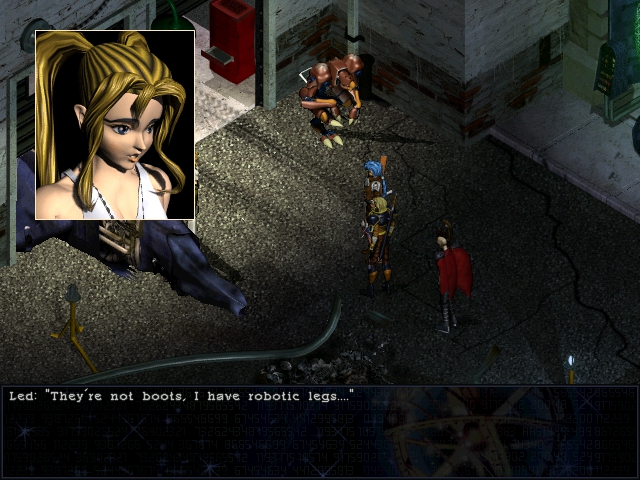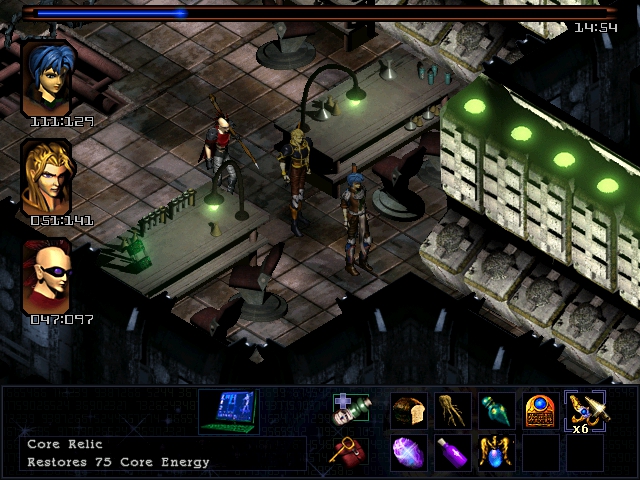Search
[{{{type}}}] {{{reason}}}
{{/data.error.root_cause}}{{{_source.title}}} {{#_source.showPrice}} {{{_source.displayPrice}}} {{/_source.showPrice}}
{{#_source.showLink}} {{/_source.showLink}} {{#_source.showDate}}{{{_source.displayDate}}}
{{/_source.showDate}}{{{_source.description}}}
{{#_source.additionalInfo}}{{#_source.additionalFields}} {{#title}} {{{label}}}: {{{title}}} {{/title}} {{/_source.additionalFields}}
{{/_source.additionalInfo}}- Details
- Category: Computer
- By J. Todd Cumming
- Hits: 4501
Septerra Core (PC)

Septerra Core
Developed by: Monolith
Published by: Topware Interactive
Released: October 31, 1999
Available on: Linux, macOS, Windows
Genre: RPG
ESRB rating: T for Teen (animated blood, animated violence)
Number of players: 1
Price: $4.99
During the 1990s, a slew of role-playing games hit the market. Some went on to become powerful franchises, while others faded into obscurity. Still others turned into “sleeper hits,” receiving little attention when they were first released, but they gained a steadfast fan following. “Septerra Core,” from Topware Interactive, falls into this category. Released in 1999, it has a dedicated following, and many of our readers have wanted us to do a review of this game.
The world of Septerra consists of several continents arranged as a series of shells, in a sort of clockwork structure. Every 100 years, the continents align in such a fashion that light from the sun can reach the core, and with the proper key, can supposedly unlock the doors to Heaven. Septerra Core focuses on a young woman named Maya. Her hometown and family were destroyed by a group living on the shell above hers, and she burns with a desire for vengeance. Her efforts lead her to become embroiled in a plot to unite the pieces of the key and activate the core, and the fate of the entire world is at stake.
The plot is adequate to move the story forward, but doesn't deviate too much from an “on the rails” format. While the pacing is somewhat sluggish, it is interesting enough to keep moving forward. It doesn't get much better than “interesting,” though; there really aren't any “wow” moments, or character traits that really hook the player, compelling them to play more in order to see what happens next. The world itself is intriguing, at least; an odd mishmash of cyberpunk and fantasy, with dashes of steampunk mixed in. Maya wields a large-caliber gun called a Vulcan in combat, but also can cast magic spells. One of her companions is a skilled mechanic and even constructs robot dogs, but prefers to wield wooden staves and is one of the best spellcasters in the game. The graphics are quite dated, though. The game looks like it came from the '90s, and many of the characters are simply recolors of each other. The voice acting is well done, and the music fits the tone well.

Strong Points: Interesting storyline; full voice acting
Weak Points: Clunky, redundant combat system; confusing and unnecessary magic system; long
Moral Warnings: Language; some blood; magic system involves tarot-like cards
One of the biggest weaknesses in the game is the combat. Septerra Core attempts to make a mashup of real-time and turn-based combat. Your characters have a charge meter of sorts, and the longer you wait for this meter to fill, the more powerful your attack can be when you press the button to act. While you're waiting, though, your opponents also can attack, based on their own (hidden) charge meter. So it becomes a bit of a balancing act of deciding to wait for a more powerful attack, or trying for several quicker, but less damaging attacks. In many ways, the actions you can take in combat resemble JRPGs. Your character can launch attacks, or cast spells, or use items when you initiate your turn. However, the limitations become obvious – and aggravating – when you first encounter the undead in the game. One of the actions that zombies can take on their turn is to shuffle slowly toward one of the characters in your party. This isn't exactly a problem – they hit like a truck, and it's nice to have time to wear them down before they get close. But it's pathetic that the best way to defeat these creatures – backing away while hitting them with your ranged weapons – is denied to you simply because of the fact that you don't have the choice of moving in combat. Your characters can leap from the middle of the party, smack an opponent with a stick, and then leap back into formation, but can't manage the simple act of walking away? While the combat system is different from many other role-playing games, it's executed in a clumsy, often irritating, fashion.
Even worse than the combat system, though, is the magic system. You are given one magical, tarot-like card near the beginning of the game, as well as some rudimentary instruction on how to use it. You discover more cards over the course of the game, which unlock more spells. The problem is that there's nothing in the game that explains how these cards are supposed to interact with each other, or how to use them effectively. I actually had to look up a guide on the Internet to make any sense of what you are supposed to do, and even then it seemed to me that it would be more effective to simply use your standard attacks and items – especially given the limits in the collective magic pool where all party members draw magical energy from. The magic system seems superfluous to the game as a whole. While it could potentially flesh out the game world, it also can be completely ignored with no real effect on the gameplay. As a result, combat becomes little more than a grind – wear down your opponents, eat food when your health gets low, repeat. Fighting the bosses isn't any different than fighting the trash mobs. It got to the point where I actively tried to find ways to avoid fighting simply to save time.

Higher is better
(10/10 is perfect)
Game Score - 54%
Gameplay - 10/20
Graphics - 4/10
Sound - 5/10
Stability - 4/5
Controls - 4/5
Morality Score - 72%
Violence - 6/10
Language - 5/10
Sexual Content - 10/10
Occult/Supernatural - 7/10
Cultural/Moral/Ethical - 8/10
The game is quite lengthy, and some players report putting 50 or more hours into it. Part of the issue, though, is the lack of a fast travel option. Sometimes to revisit certain key locations, you need to pass through areas several times, often at points where the enemies no longer pose a challenge to you, but you are forced to fight them anyway. A lack of a journal also doesn't help, as it can be easy to lose track of what you're supposed to be doing next. There are guides available on the Internet to help you get back on track, at least. If you're playing the game on Steam, there are no achievements, but you can at least get trading cards. As a final note, those using the Mac and Linux ports should be aware that the developers have used Wine to handle the translation from the original Windows release, so there could be the potential for bugs or slowdowns from having to deal with an emulator. Your mileage may vary in this regard.
There are a few elements to consider in regards to the moral front. A few naughty words do appear, such as b****rd and a**e, but they tend to be few and far between. The Lord's name also is taken in vain a couple times. There is an occasional spray of blood from attacks, but the blood doesn't remain, and corpses quickly fade away when they fall. Undead appear in a few areas, but given the crude graphics they aren't very detailed. There are references to demons, including the ability to summon and command beings that claim to be demons, but the theological system is one of fantasy. The mythology of the game does borrow heavily from Christian theology (e.g. the “savior” of the world is the only-begotten son of the “Creator”) but this shouldn't be mistaken for a Christian game by any means.
Septerra Core is well-loved by those who played it in the 1990s. Is it a good game? Sure, it has some good qualities. But is it a great game? A classic? I would argue that this assessment is a stretch. The dated graphics, the sluggish plot, and the poorly implemented combat and magic systems can make this game more of a chore than an escape. Other role-playing games from this era were much more solid. Although it has a few fans, Septerra Core is deservedly forgotten.






